Political Reporter, BBC Derby
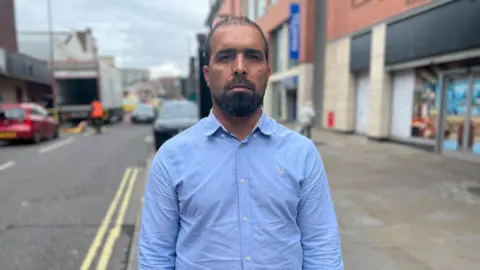 BBC
BBCWhen Mohammad arrived in Derby in 2022 from Afghanistan, he was relieved to have escaped the Taliban government which had just regained power.
He was staying alone in a hotel in the city with other asylum seekers awaiting a decision from the Home Office on whether they could stay.
Mohammad was delighted to be granted refugee status in 2023 – but he was then given a month to leave his accommodation.
It marked the beginning of a nerve-wracking four-week wait to see if the local council could help.
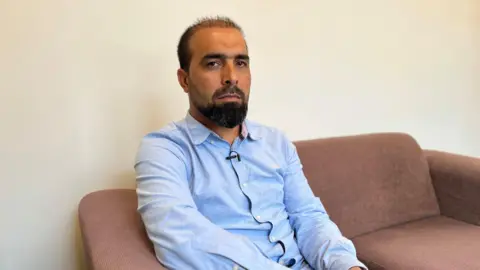
Mohammad says worry was widespread in the hotel among those granted refugee status that they would soon be on the streets.
“In Derby, the demand for housing is very, very high”, he said.
When the final day of his notice period arrived, the council still had not managed to find him accommodation.
But a friend then approached him with a solution – a charity which offers refugees a temporary room with a local family while they try to establish themselves.
“One of my friends was living with a hosting family. I contacted him, he said there is a community of people helping [refugees] who are homeless,” Mohammed said.
Mohammad says he felt lucky to come into contact with the Derby refugee charity Upbeat Communities the day before he says he would have been left on the streets.
Others he knew from the hotel told him they had been forced to gather at the train station at midnight, night after night, where the council routinely picks homeless refugees up and places them in short-term emergency accommodation.
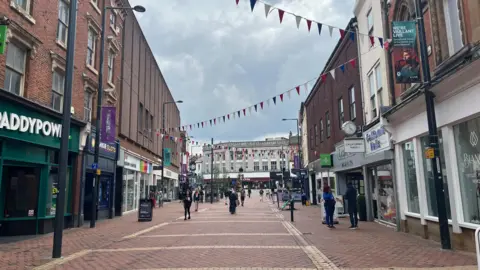
The Home Office is responsible for housing asylum seekers, but they are moved on from their government-funded accommodation a month after they are granted refugee status.
In 2023, there were 187 refugees classified as homeless in Derby. That number increased by 70% in 2024 to 326.
The number of those refugees found sleeping rough for at least one night in 2023 was 16. By 2024 that number had increased to 161 – a tenfold increase.
Local councils in the UK have a legal responsibility to help anyone who is homeless or at risk of homelessness – but many are facing significant challenges meeting housing demand.
‘Massive challenge’
Andrew Jackson who oversees the Host Derby scheme at the charity which helped Mohammad, says they have seen referrals rise to the point where they can now only help around half of the cases.
“We initially started it up to respond to the needs of asylum seekers [whose claim for asylum had been rejected by the government] who were destitute, who needed help with housing,” he said.
“But over the last few years we’ve seen increasing demand from those recognised as refugees in the UK, at risk of homelessness, needing support once their Home Office support stopped.
“The challenges around social housing demand, around private rental costs, means that people are ending up in street homelessness.
“It’s a massive challenge, a massive situation.”
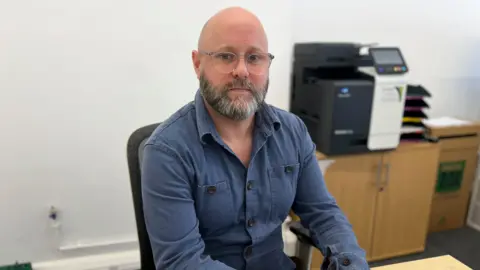
Mr Jackson said a backlog of asylum seeker claims from the previous government under the Rwanda policy that have suddenly been dealt with by the Home Office could be a factor behind the rise in the numbers sleeping rough.
Derby City Council says that it recognises that more refugees are sleeping rough and considered homeless, but the most vulnerable must be prioritised in the long queue for social housing.
The authority says it cannot prioritise refugees, unless they have other vulnerabilities.
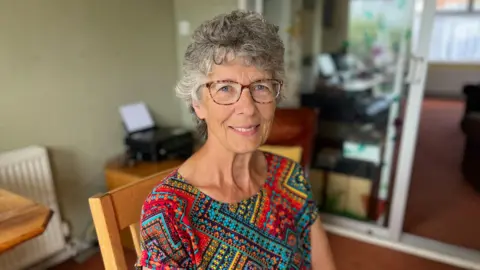
Gillian Scothern was a volunteer with Upbeat Communities helping with English language lessons and started to notice many of the refugees she was helping were suddenly becoming homeless on receiving their decision from the government.
“I felt quite bad about that because we’ve got spare rooms,” Ms Sothern said.
She then decided to make the spare rooms at her home available to refugees through the host scheme, which she described as “important”.
“The first person to come, he was so traumatised for sleeping rough for such a long time.
“He had a bad knee injury and was about to get it operated on, and it was cancelled at the last moment because they discovered he was homeless and they wouldn’t be able to discharge him anywhere.
“I think he felt that his life was finished, more or less…and I just thought, he’s exactly the same age as my son. And look at him.”
“We talk so much about human rights, and one of the basic human rights is surely to have food and shelter.
“These are people who want to get on in life. They just want to make a life again.”
Mohammad is now looking forward to a brighter future as his family have recently been able to join him in the city.
But he says he will always be grateful to his host family.
“They gave me everything,” he said.




